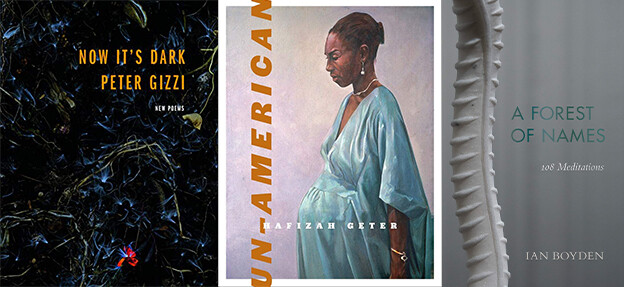
Remembrance texts
Kelly Liu

Editorial assistant Kelly Liu reviews three 2020 titles from Wesleyan University Press, each touching on memory and loss.
Now It’s Dark, Peter Gizzi (Wesleyan University Press, 2020)
Now It’s Dark begins with a dedication: “for my brother Tom // also gone.” In the face of unrelenting, constantly encroaching threat of mortality, Gizzi pens a collection of poetry that mourns those who passed and those who will continue to. In a dark world inhabited by ghosts, simultaneously aftermath and augury, Gizzi wades through physicality with an acute sense of its already-absence. Perhaps its most haunting line, “Say what’s a grammar when you is no longer you,” questions the limits of language: how can language work when the object of reference no longer exists materially, when the ‘you’ who was once alive and breathing becomes the abstract ‘you’ left behind in thought? As it seeks to preserve some semblance of life, to write the phenomenological world into the world of poetry, Gizzi’s work is a continuous attempt to inscribe: “I want to tell you this isn’t just all song. // I want to say this scrap of paper had sky in it.”
Un-American, Hafizah Geter (Wesleyan University Press, 2020)
Geter’s Un-American traces and maps both public and private, transnational and familial, histories deeply embedded in race, culture, colonialism, gender, and religion. A constant negotiation with places and people, Geter offers narratives and bears witness, from intimate familial portraits to a series of “Testimony” poems written after Black victims of police brutality. In a country where “They fire their police chief / vote him Sheriff,” Geter poses sharp ontological inquiries about America and its continued violence, about the hope and the reality of “my parents’ / American Dream, a switch that turns / all their ghosts on,” about Black and immigrant experiences in a place where one’s only shelter from the “Confederate heat” is a mother’s figure, “her shadow my only relief.” Where danger looms and “Not even / Nikes can hold me,” we’re left wondering not only what it means to be American, but how.
A Forest of Names, Ian Boyden (Wesleyan University Press, 2020)
In A Forest of Names, Boyden stitches together a constellation of 108 poems in memory of the children who perished in the 2008 Sichuan Earthquake. Using their names as the titles for his luminescent poems, Boyden builds and cherishes an ephemeral landscape, often finding recourse to nature: “It didn’t have to be a flower. / He could have presented a single leaf.” And the poem “飛飛,” which literally translates to “fly fly,” is titled “Profusion of Wings,” wherein “Her name an invisible bird— / wanting to take flight // from each mouth that called for her.” A poetics that revels in slant simplicity, transforming aphoristic images into instant, poignant snapshots that disappear all too quickly, A Forest of Names holds in tenderness feelings of longing, loss, and most importantly, remembering: “Because the reading is also a becoming, / in his name there stands / a person who reads these texts—”